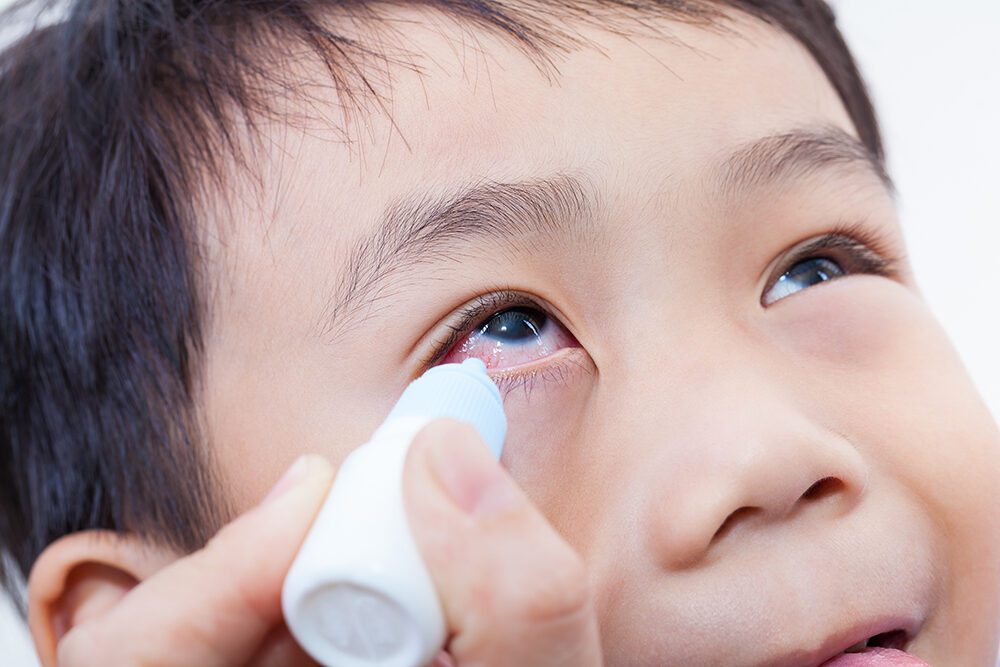How Does Pink Eye Happen?
Pink eye is a very common illness amongst children and adults seen at CMC Primary Care and CMC Pediatrics. Formally known as conjunctivitis, pink eye occurs when the lining of the eyeball becomes inflamed and red or pink in color. Your eye may also feel gritty, itchy, crusty, and have a gooey discharge. Symptoms can vary because pink eye isn’t always caused by the same thing.
Sometime it’s simply inflammation caused by a reaction to something in the environment and some are caused by infection. The infection could be bacterial or viral. An examination by a doctor is crucial to determine the cause of the pink eye and to prescribe proper treatments.
Common symptoms of pink eye
- Pain in one or both eyes
- Red or pink color of the white of the eye
- Eye discharge in one or both eyes
- Itchy, irritated or burning eyes
- A gritty feeling in the eye
- Watery eye

Viral pink eye symptoms (in addition to the common symptoms)
- Eyelid may be mildly swollen
- No pus or yellow discharge
- Other signs of a cold like a runny nose or sore throat
Bacterial pink eye symptoms (in addition to the common symptoms)
- Yellow or green discharge or pus in the eye
- Dried pus on the eyelids and eyelashes
- Eyelids stick together after sleep
- Eyelids are often mildly swollen
Allergic pink eye symptoms (in addition to the common symptoms)
- Contact occurs with an environmental allergen such as animal dander, or the presence of persistent symptoms during a particular pollen season
- Seasonal allergy symptoms like clear runny nose, itchy nose, and sneezing
- No pus or yellow discharge
Sometimes it can be induced by other illnesses like ear infections, sinus infections, chickenpox, and herpes virus.
Is pink eye contagious?
Yes. When pink eye is caused by an infection, it can spread very easily. The main way you can catch it is by touching something that has been in contact with an infected person’s eye. If an infected person touches someone else, and then that person touches their eyes, they may contract it.
If someone you know has it, avoid touching their pillowcases, towels, makeup, eyeglasses, or other personal items. Keep your hands clean and avoid touching your eyes.
If you have pink eye
The Centers for Disease Control and Prevention recommends that if you have pink eye, to use these precautions to avoid spreading it to others:
- Don’t touch or rub your eyes. This can make pink eye worse or spread it from one eye to another.
- Don’t use the same eye drops in both the infected and uninfected eye.
- Wash your towels and bed linens in hot water often, and wash your hands after starting your laundry.
- Skip swimming pools until the pink eye has cleared.
- If you wear contact lenses, switch to glasses until your doctor says it’s all right to wear contacts again.
- Throw away any makeup, makeup brushes, disposable contact lenses, and contact lens solution that you used while sick.
- Follow your doctor’s instructions for cleaning extended-wear contact lenses, and also clean any glasses you used while sick.
What should I do if I think I have pink eye?
Most of the time it will heal on its own within a week or two, but keep in mind that pink eye has many causes and therefore evaluation may be needed by a medical professional. See your doctor if your eye hurts, are having trouble seeing after blinking, or are experiencing multiple or severe symptoms. The CDC also recommends that infants and people with weakened immune systems should see a primary care provider if pink eye is suspected.

To relieve discomfort, lubricating eye drops and a cold compress can help reduce redness and swelling. For more serious cases your doctor may prescribe antiviral medications or antibiotic eye drops. If your pink eye is caused by allergens, your physician may recommend oral antihistamines and antihistamine eye drops.
It’s important to keep monitoring your symptoms whether you are taking medications or not. If they worsen, you’ll want to check in with your doctor again. If you do not have a primary care provider, CMC Primary Care and CMC Pediatrics have locations across Horry and Marion county that are accepting new patients. When it comes to pink eye, our CMC physicians will help you see clearly again.
Pediatric Care Locations
Conway
Carolina Forest
Myrtle Beach
Primary Care Locations
Aynor
Conway
Carolina Forest
Little River
Murrells Inlet
Myrtle Beach




